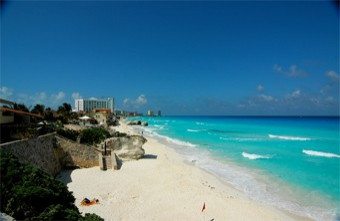Could A Bank Run In Tiny Cyprus Spread To Italy Or Spain And Then Across Europe Before Finally Hitting American Pocketbooks?

There is a specter haunting Europe and it is the specter of widespread bank runs.
Prospects of millions of Europeans simultaneously emptying their savings and checking accounts has arisen from the quiet, idyllic Mediterranean Sea island of Cyprus, which with its debt at 140 percent of GDP is teetering on insolvency. To avoid a financial collapse, the euro zone member has queued up in the same line that Greece stood in to get several bailouts from the so-called troika, as the European Commission, the European Central Bank and the International Monetary Fund (IMF) are collectively known.
Observers find nothing unusual in that the euro zone's peripheral, debt-choked economies have been in a financial and banking crisis for years now and as each of the most indebted nations -- five in five years -- face defaulting on their sovereign debt, the troika has come in with a rescue. Big institutional holders of government bonds have suffered losses, but individual depositors have always been protected ... and thus left with the impression that their savings and checking accounts are safe.
Over the weekend, though, the troika stunned the financial world by demanding -- successfully -- that Cyprus levy a one-time fee on ordinary bank depositors' holdings. With its back to the wall, Cypriot leaders agreed Saturday to take 6.75 percent of bank account deposits under €100,000 ($129,562). Accounts with balances more than €100,000 would surrender 9.9 percent of their assets.
A virtual bank run ensued: Cypriots flocked to local automatic teller machines to withdraw as much as they could, but since Monday was a bank holiday they couldn't empty their accounts and protect them from the government grab. The blowback forced the troika and Cyprus' government to try to modify the terms of the rescue package and delay until at least Tuesday any vote on a bailout package.
Nevertheless, the damage has been done: The global financial community has now seen that the troika is willing to expropriate the holdings of individual depositors as the price of a financial rescue. If Italy or Spain turn out to also need a bailout, as many fear, then millions of Italians and Spaniards could do as Cypriots are trying to do: run on their banks.
"Imagine confiscating what has always been viewed as 'safe savings' -- having insured depositors take a hit touches off an important precedent (feel safe in any Spanish or Italian bank right now? The knock-on effects may not be trivial)," David A. Rosenberg, chief economist and strategist for Gluskin Sheff, a Canadian money manager, said.
The effect is already global. Company shares around the world fell Monday, led down by banks, the most vulnerable to Europe's potential financial mayhem. Asian equities were heading for their biggest decline in eight months, the euro dropped to its lowest level this year, and gold climbed up past $1,600 per troy ounce.
“This is potentially a big deal in terms of the global fallout as well. The economy of Cyprus is tiny (the country’s GDP is just $22 billion, or 0.2 percent of the euro-zone total) but far-reaching financial crises often have small beginnings and wars have been started over less,” said Julian Jessop, chief global economist with London-based Capital Economics. “What’s more, if the rest of the EU is unwilling to cut a better deal for such a small economy at minimal cost, what chance is there for the bigger ones?”
The implications could stretch far beyond the EU.
“A further escalation of the crisis in tiny Cyprus may have global implications well beyond the immediate market reactions today. It could influence the course of fiscal policy in the U.K. and monetary policy in the U.S., sap appetite for the ‘Abe trade’ in Japan, and revive safe haven demand for gold. What’s more, the return of fears that one or more countries may actually leave the euro zone altogether could lead to a sustained correction in the prices of riskier assets generally.”
© Copyright IBTimes 2025. All rights reserved.






















